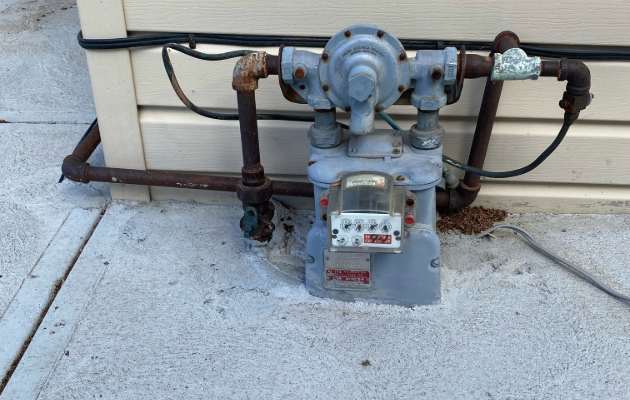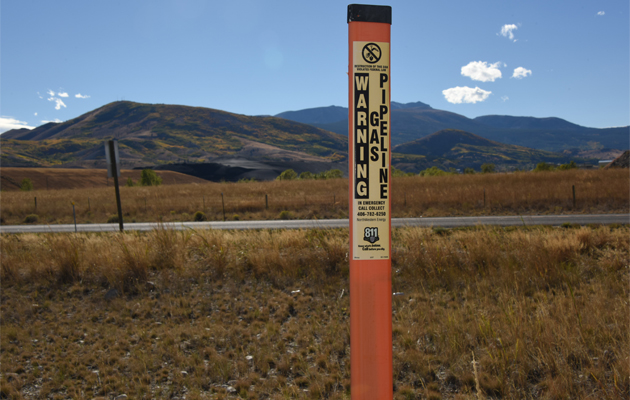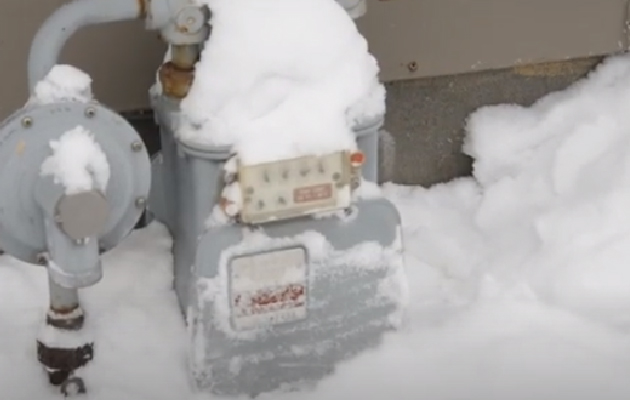Our emergency line is available 24 hours a day.
Montana: 888-467-2669 | South Dakota/Nebraska: 800-245-6977 | In case of a life-threatening emergency, dial 911.
What to do if you smell natural gas
Do not build or pour concrete near meter

Do not build or pour concrete near meter
Your safety is our top priority. We want to educate customers about the importance of avoiding pouring cement or placing any structures around your natural gas meter.
Why is it important not to build or pour concrete near your meter?
- State and federal regulations strictly prohibit encasing risers and meters in concrete. Additionally, the lock wing valve must remain accessible at all times in case of an emergency. If concrete is placed near a riser, you must use a sleeve to prevent direct contact.
- Clear access for our crews. Natural gas meters require 10’ clearance above porches/decks and in a radius in front of the meter to allow safe access for maintenance, repairs, or emergencies.
- Proper ventilation and flow to your home. Your natural gas meter’s regulator vent must always be clear so the flow of natural gas into the home can be regulated properly. If this vent becomes obstructed, the pressure of gas flowing into the home could either increase to a dangerous level, resulting in a fire, explosion or the buildup of deadly carbon monoxide, or decrease, preventing natural gas from flowing to your gas appliances.
How can you help?
- Always keep the area around your meter clear of cement, structures or obstructions.
- If you’re planning to do any construction or landscaping near the meter, please contact us.
- Report any suspicious changes or damages to any gas meter and lines immediately.
Let’s work together to keep your family, neighbors and our crews safe. We work 24/7, year-round to keep our communities safe, but we need your help to prevent avoidable hazards and damages.
Call before you dig
Clean and clear after every snowstorm
Just like scraping off your car or shoveling your sidewalks, it’s important to take care of your natural gas meter after it snows.
Keep your natural gas meter clear of snow and ice:
- Make sure your gas meter’s regulator vent is clear of snow and ice so the flow of natural gas into the home can be regulated properly. If this vent becomes plugged, the pressure of gas flowing into the home could either increase to a dangerous level, resulting in a fire, explosion or the buildup of deadly carbon monoxide, or decrease, preventing natural gas from flowing to your gas appliances.
- Clear snow from the meter and associated piping. Allowing a winter’s worth of snow to pile up on a meter or pipes can lead to pipes breaking, causing dangerous gas leaks.
- Clear off your gas meter gently using your hands or a broom.
- Never use a shovel or other sharp tools to cut or chop away snow and ice because they can damage the meter or lines close to the meter.
- Do not kick or hit your natural gas meter to break or clear ice.
- Snow should also be cleared from the roof above the meter to prevent falling snow or ice from damaging the meter or associated piping. Remove icicles from overhead eaves and gutters to ensure dripping water does not splash and freeze on the meter or vent pipe.
- Chimneys and vents for natural gas appliances must be cleared following a major snow or ice storm to enable proper venting and prevent carbon monoxide accumulation.
- Avoid using a snowblower or snowplow near your natural gas meter and any associated piping.
- Do not shovel snow up against the meter or vent pipe.
- Check your meter and pipes often throughout the winter.
- If you rely on a snow removal company to clear your property, be sure they are also clearing snow and ice from your meter, and a path to your meter. If you have a seasonal property or are away on vacation, ask someone to check your natural gas meter and vents, especially after a significant storm.
If you have any questions or concerns, please contact us.
Pipeline markers

Pipeline markers
How to Recognize a Gas Pipeline Leak
Call 911, if you notice any of these signs of a pipeline leak:
- An unusual blowing or hissing sound coming from the ground.
- Dirt or dust blowing from a hole in the ground.
- Bubbling ponds.
- Dead or discolored vegetation in an otherwise green area near a pipeline right of way.
- A fire close to a buried pipeline.
Pipeline Purpose and Reliability
Pipelines are the safest way to transport energy products, including natural gas, crude oil and other fuels. The U.S. Department of Transportation’s Pipeline & Hazardous Materials Safety Administration (PHMSA) regulates pipelines with the help of state partners. According to government and industry statistics, the most common cause of pipeline incidents is improper or unauthorized digging near a pipeline, which is why it’s important to call 811 before you dig. Pipeline operators carefully build, maintain and monitor the integrity and security of their lines.
Excess Gas Flow Valve Notice
If a gas service is installed to your home, you have the option to purchase an Excess Flow Valve (EFV) to be installed by NorthWestern Energy. An EFV is intended to reduce the flow of gas if the service line is severed. The EFV Valve is placed in the service line where it leaves the gas main.
An EFV will reduce the flow of gas only if the service line is severely damaged. It is important to note that an EFV will not protect you from a leak or broken line inside your home, or a small leak on the line in your yard. An example of when the valve provides protection is in the event the gas service is damaged from digging or extreme ground movement.
As required by the U.S. Department of Transportation (DOT), we are notifying you that an EFV that meets the minimum prescribed DOT performance standards, is available for installation on your natural gas service line.
The cost of installing the EFV will need to be evaluated by an engineer. If you are interested, please contact your local NorthWestern office to set up an appointment. Payment is required prior to installation of the EFV.
Call 811 before inspecting or clearing sewer lines
NorthWestern Energy & the Canada Montana Pipeline Company
Safety information
Natural Gas Safety FAQs
How frequently should I clear my natural gas meter and natural gas appliance vents?
After every snow, be sure to clear off your gas meter gently using your hands or a broom. Never use a shovel. Gas meters have a vent that regulates pressure. If snow piles up and covers the vent, it won’t work properly. This could lead to a service interruption or even a gas leak, which could cause a fire or explosion.
Also be sure all appliance exhaust vents are clear from blowing and drifting snow. Blocked appliance vents could result in a buildup of deadly carbon monoxide.
Visit Natural Gas Safety to learn more.
What should I do if I recognize a gas pipeline leak?
Call 911, if you notice any of these signs of a pipeline leak:
• An unusual blowing or hissing sound coming from the ground.
• Dirt or dust blowing from a hole in the ground.
• Bubbling ponds.
• Dead or discolored vegetation in an otherwise green area near a pipeline right of way.
• A fire close to a buried pipeline.
Visit Natural Gas Safety to learn more.
Is the regulator on my gas meter the only part that needs to be cleared off?
Make sure to keep your gas meter clear after a storm. Remove snow and ice from the gas meter, piping and regulator. This will help your gas meter work properly and allows us to access your meter easily in the case of an emergency. Please also maintain a clear path to your meter.
If ice begins to build up on your meter that you can’t brush off with your hands or a broom, please contact us at 888-467-2669 in Montana or 800-245-6977 in South Dakota/Nebraska.
Visit Natural Gas Safety to learn more.
What are pipeline markers?
Pipeline markers, placed at all public road and railroad crossings, show the approximate location of pipelines and identify the companies that operate them.
These markers indicate the pipeline content, the name of the pipeline operator and the operator’s emergency phone number. Even if the pipeline is marked, you must call 811 to have utility lines marked before digging. The pipeline may not follow a straight course between markers.
Visit Natural Gas Safety to learn more.
What to do if you smell natural gas?
NorthWestern Energy makes it easy for you to detect natural gas leaks by adding an unpleasant rotten egg or skunk-like smell to natural gas. If you smell this odor:
- Get away. Leave the area immediately.
- Don't create a spark. Do not use phones, matches, light switches or anything else that could trigger the ignition of the gas.
- When at a safe distance, call 911.
Visit Natural Gas Safety to learn more.
How much does an Excess Flow Valve (EFV) cost?
The cost of installing the EFV will need to be evaluated by an engineer.
If you are interested, please contact your local NorthWestern Energy construction office to set up an appointment. This payment is required prior to installation of the EFV.



